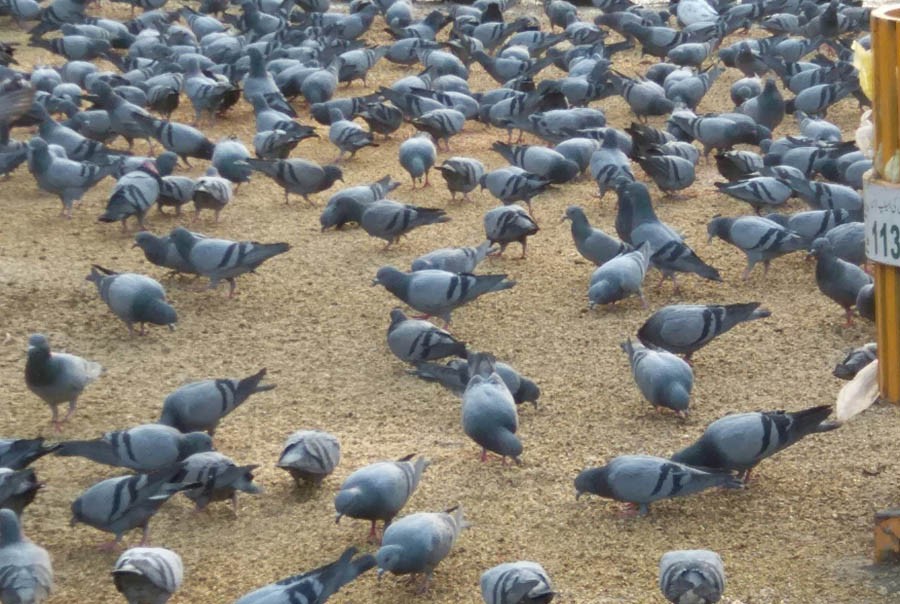
Why do people feel compelled to feed birds, and will the tradition move on to the next generations?

It was not something to be questioned. We the children had to shred last night’s roti into very small pieces, small enough to feed the sparrows and annoy the crows. My father was clear about his dislike for crows. There were lalis and pigeons of course that were equally welcome but not the crows, even though nothing could stop them. The leftover boiled rice seemed like a blessing the next morning because roti was a lot of work.
There were clay plates (koondas), safely placed on walls in a way that cats couldn’t push them down. There were two separate ones, one for water, one for daana (grains). Or they were simply left on the floor with daana, pani.
Feeding birds is a custom across many cultures and it’s a very "city" thing. Here in Lahore, there is a whole variety of grains that are used as birdfeed but bajra (millet), makai (corn), gandum (wheat), rice and lentils are more popular, with bread crumbs coming in handy too. The koondas are placed on rooftops, outside homes, in parks, and at certain designated places in the city. In summers, the birds also like to bathe and splash in water.
At the Race Course Park where I go for walk, I see people regularly bring food for birds and insects. The one for insects is spread around the base of tree trunk where the birds are also free to come; strangely, this feed includes white sugar. Some people regularly bring envelopes full of grains and sprinkle them on specified places in the park. At homes, you get a chance to see some odd and beautiful birds, which you otherwise miss. In most public places, populated mostly by pigeons.
Why do people feel compelled to feed birds? At Charing Cross, at Istanbul Chowk near Zamzama Cannon on the Mall Road, outside Government College (now University) and many other places, people start bringing grains and water pretty early in the day. Around 6.30am, these places are already filled with the daily staple feed and water. And people keep coming.
At the Charing Cross, two men stand and crush biscuits and cake into crumbs, because the shop selling grain wasn’t yet open. They come here from nearby Mozang. "I do this before going to work because, like we leave home to earn money for food, these birds leave home too in search of food," says one of them.
"Different grains attract different birds. It’s a fact that we are fast losing many varieties of birds, like the green parrot," the other one remarks.
Thankfully, birds have not yet adapted to complex cooked curries, and prefer simple, basic food. And most of these grains are still inexpensive.
A tandoorwala parks his bike and spreads the feed on the pavement near Zamzama cannon. He’s come from Bhaati which is where his home and workplace are. He feeds the birds at home as well and then comes here. "These birds pray for us. Whatever we do is insufficient; the more we give, the more God gives us," he says. "Soon there will be a buzurg (oldie) who will come pour water in the koondas." And yes, soon the buzurg from Lakshmi Chowk was there.
I feel the city and its residents owe it to the birds and insects that have been displaced. Cities with their built places have replaced natural habitats, most importantly trees. We cut so many trees which has led to the loss of a wide variety of birds; parrots being a notable example which have vanished in our lifetimes. Feeding birds is only a minimum compensation.
People feed birds for different reasons. For some it’s voluntary charity, for others, it’s a way to ward off evil (balaain tul jati hain). The oldie who is cleaning the clay plates says, "They are bezuban (voiceless). We humans can ask or beg for food. If we feed them, Allah will listen to us." A helper at NCA brings bread crumbs from Youhanabad "just for the sake of birds (inn ka bhala ho jaye)".
Many complain that the GPO Chowk was their go-to place to feed birds. But the Orange Train and the closure of that sector of the Mall has uprooted the pigeons. "Kabooter rul gai nain," one gentleman remarks in Punjabi with sadness. I assure him they may have moved to other places.
Istanbul Chowk remains Lahore’s equivalent of Trafalgar Square where the sight of feeding and flying pigeons in flocks rejoices all passersby all times of the day.
Amidst most people bringing food on motorcycles and cycles, a car with a young couple and a toddler slows down and comes to a halt. The man rolls down the window and makes the toddler offer food to the birds.
Tradition continues.
This article was published in The News on Sunday on March 18, 2017 under the title ‘For some it’s voluntary charity.’